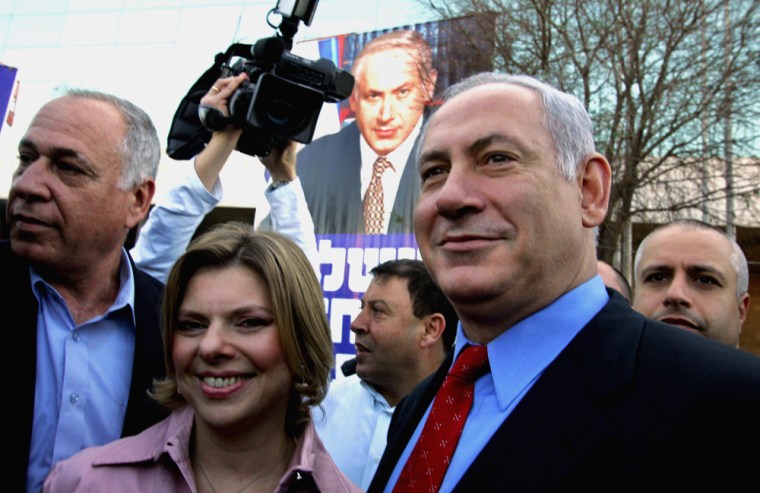Former Prime Minister Benjamin Netanyahu scored a wide victory in Likud party primary elections to run against Ariel Sharon as candidate for prime minister in March elections, and his main opponent conceded defeat.
Exit polls from all three Israeli TV stations showed Netanyahu receiving 47 percent of the vote, while Foreign Minister Silvan Shalom got 32 percent, right-wing extremist Moshe Feiglin 15 percent and Agriculture Minister Yisrael Katz 6 percent.
Initial vote counts, including seven of the 149 voting stations, showed Netanyahu leading Shalom 43.1 percent to 37.4 percent.
Ilan Ostfeld, an aide to Shalom, said Shalom called Netanyahu to congratulate him on his victory. Though not all the votes were counted, Ostfeld told Israel Radio, “The trend is clear.”
Netanyahu, a strident hard-liner who quit Sharon’s government in protest over his pullout from Gaza and the West Bank in the summer, was expected to lead Likud into the most hawkish camp of the Israeli political spectrum, leaving the center for Sharon’s new party, Kadima. Polls taken before the Likud primary show the party taking a severe beating in the March 28 election.
The exit polls questioned 599 Likud voters and quoted margins of error of 4.5 percent, the TV stations reported.
If the poll results are translated into the actual outcome, Netanyahu would succeed Sharon as head of the Likud party. Sharon, who helped found the party in the 1970s, quit last month after an internal rebellion against his Gaza pullout.
Sharon left Likud to create Kadima party
Sharon set up Kadima, taking a dozen Likud members of parliament with him and adding some prominent members of the left of center Labor Party — including elder statesman Shimon Peres.
Cabinet Minister Meir Sheetrit, who left Likud along with Sharon and joined Kadima, said Netanyahu's victory would help Kadima, because “it distinguishes his party from Kadima.” Shalom is seen as a more moderate figure than Netanyahu, and might have attracted centrist voters away from Sharon.
Newspaper polls show the Likud losing two-thirds of its strength in the March election, dropping from 40 seats to around 12 — a stunning comedown for the party that has dominated Israeli political life since 1977, when it first rose to power.
Sharon’s new party is far ahead in the polls with about 35 seats out of the 120 in the parliament.
“We need to present an alternative to Sharon’s policy of unilateral withdrawals that have brought Qassam (rockets) to Ashkelon,” said Likud faction chief Gideon Saar, referring to rockets fired by militants in Gaza that exploded not far from the Israeli city.
Netanyahu first held position in 1996
Netanyahu, who served as prime minister from 1996-1999, is an experienced campaigner and polished public speaker. Political analyst Hanan Crystal thought Netanyahu would be the toughest candidate against Sharon.
“Netanyahu has already defeated a sitting prime minister (Peres in 1996), and he can do it again,” Crystal told Israel Radio.
Netanyahu quit Sharon’s government days before the beginning of the Gaza pullout in August, saying he could not take responsibility for the withdrawal. Shalom, who grudgingly backed the pullout, stayed in the Cabinet and remains foreign minister.
The Likud primary fills out a picture of the Israeli political scene that was scrambled by Sharon’s decision to leave Likud four weeks ago. That decision followed the surprise victory by fiery labor union chief Amir Peretz over Peres as Labor Party leader.
Peretz intends to emphasize domestic issues like increasing poverty and the growing gap between rich and poor instead of basing his campaign on Israel's policy toward the Palestinians — the issue that has decided elections for three decades.
Newspaper polls show Labor gaining a few seats from its present 21.
However, all the results could change now that all three main parties have recognized leaders — and Sharon's health has suddenly become an issue. Sharon suffered a mild stroke on Sunday and is to be released from a Jerusalem hospital on Tuesday, according to his doctors, who assured reporters that Sharon, 77, suffered no permanent damage from the stroke.
